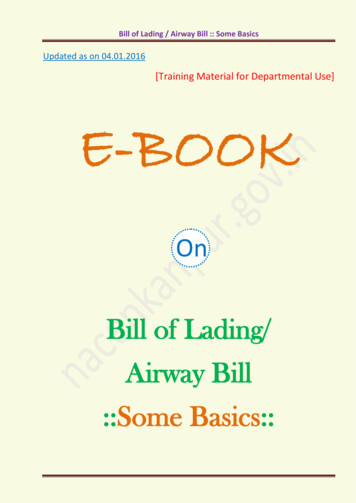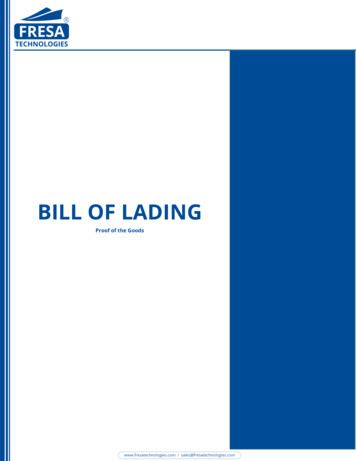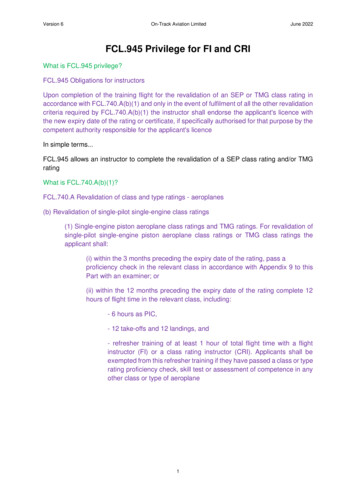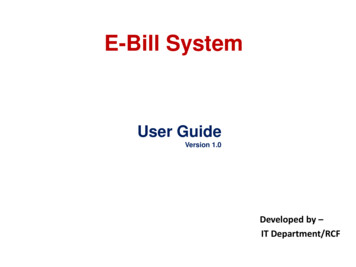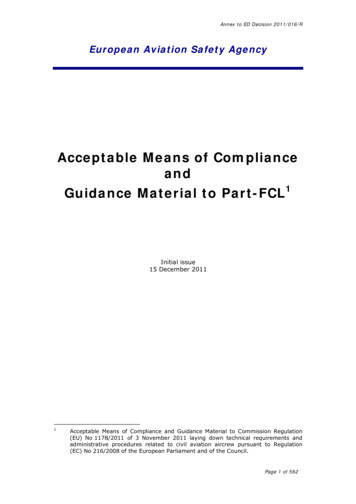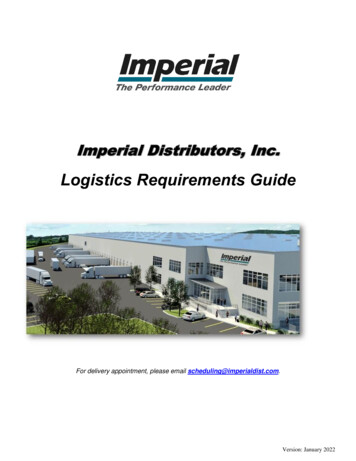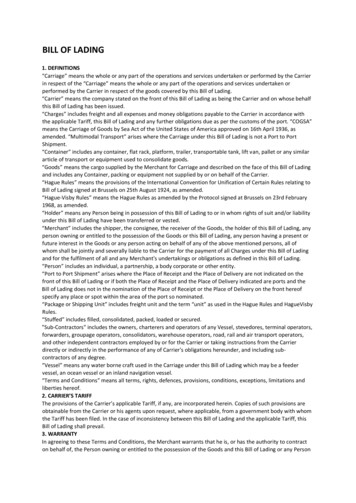
Transcription
BILL OF LADING1. DEFINITIONS“Carriage” means the whole or any part of the operations and services undertaken or performed by the Carrierin respect of the “Carriage” means the whole or any part of the operations and services undertaken orperformed by the Carrier in respect of the goods covered by this Bill of Lading.“Carrier” means the company stated on the front of this Bill of Lading as being the Carrier and on whose behalfthis Bill of Lading has been issued.“Charges” includes freight and all expenses and money obligations payable to the Carrier in accordance withthe applicable Tariff, this Bill of Lading and any further obligations due as per the customs of the port. “COGSA”means the Carriage of Goods by Sea Act of the United States of America approved on 16th April 1936, asamended. “Multimodal Transport” arises where the Carriage under this Bill of Lading is not a Port to PortShipment.“Container” includes any container, flat rack, platform, trailer, transportable tank, lift van, pallet or any similararticle of transport or equipment used to consolidate goods.“Goods” means the cargo supplied by the Merchant for Carriage and described on the face of this Bill of Ladingand includes any Container, packing or equipment not supplied by or on behalf of the Carrier.“Hague Rules” means the provisions of the International Convention for Unification of Certain Rules relating toBill of Lading signed at Brussels on 25th August 1924, as amended.“Hague-Visby Rules” means the Hague Rules as amended by the Protocol signed at Brussels on 23rd February1968, as amended.“Holder” means any Person being in possession of this Bill of Lading to or in whom rights of suit and/or liabilityunder this Bill of Lading have been transferred or vested.“Merchant” includes the shipper, the consignee, the receiver of the Goods, the holder of this Bill of Lading, anyperson owning or entitled to the possession of the Goods or this Bill of Lading, any person having a present orfuture interest in the Goods or any person acting on behalf of any of the above mentioned persons, all ofwhom shall be jointly and severally liable to the Carrier for the payment of all Charges under this Bill of Ladingand for the fulfilment of all and any Merchant's undertakings or obligations as defined in this Bill of Lading.“Person” includes an individual, a partnership, a body corporate or other entity.“Port to Port Shipment” arises where the Place of Receipt and the Place of Delivery are not indicated on thefront of this Bill of Lading or if both the Place of Receipt and the Place of Delivery indicated are ports and theBill of Lading does not in the nomination of the Place of Receipt or the Place of Delivery on the front hereofspecify any place or spot within the area of the port so nominated.“Package or Shipping Unit” includes freight unit and the term “unit” as used in the Hague Rules and HagueVisbyRules.“Stuffed” includes filled, consolidated, packed, loaded or secured."Sub-Contractors" includes the owners, charterers and operators of any Vessel, stevedores, terminal operators,forwarders, groupage operators, consolidators, warehouse operators, road, rail and air transport operators,and other independent contractors employed by or for the Carrier or taking instructions from the Carrierdirectly or indirectly in the performance of any of Carrier's obligations hereunder, and including subcontractors of any degree.“Vessel” means any water borne craft used in the Carriage under this Bill of Lading which may be a feedervessel, an ocean vessel or an inland navigation vessel.“Terms and Conditions” means all terms, rights, defences, provisions, conditions, exceptions, limitations andliberties hereof.2. CARRIER’S TARIFFThe provisions of the Carrier’s applicable Tariff, if any, are incorporated herein. Copies of such provisions areobtainable from the Carrier or his agents upon request, where applicable, from a government body with whomthe Tariff has been filed. In the case of inconsistency between this Bill of Lading and the applicable Tariff, thisBill of Lading shall prevail.3. WARRANTYIn agreeing to these Terms and Conditions, the Merchant warrants that he is, or has the authority to contracton behalf of, the Person owning or entitled to the possession of the Goods and this Bill of Lading or any Person
who has a present or future interest in the Goods and this Bill of Lading, and is therefore liable for any and allCharges and Duties in connection with the Goods.4. NEGOTIABILITY AND TITLE TO THE GOODS4.1. This Bill of Lading shall be non-negotiable unless made out “to order” in which event it shall be negotiableand shall constitute title to the Goods and the holder shall be entitled to receive or to transfer the Goods hereindescribed.4.2. This Bill of Lading shall be prima facie evidence of the taking in charge by the Carrier of the Goods as hereindescribed. However, proof to the contrary shall not be admissible when this Bill of Lading has been negotiatedor transferred for valuable consideration to a third party acting in good faith.5. CERTAIN RIGHTS AND IMMUNITIES FOR THE CARRIER AND OTHER PERSONS5.1. The Carrier shall be entitled to sub-contract on any Terms the whole or any part of the Carriage.5.2. The Merchant undertakes that no claim or allegation shall be made against any Person or Vesselwhatsoever, other than the Carrier, including, but not limited to, the Carrier’s servants or agents, anyindependent contractor and his servants or agents, and all others by whom the whole or any part of theCarriage, whether directly or indirectly, is procured, performed or undertaken, which imposes or attempts toimpose upon any such Person or Vessel any liability whatsoever in connection with the Goods or the Carriage,and if any claim or allegation should nevertheless be made to defend, indemnify and hold harmless theCarrier against all consequences thereof. Without prejudice to the foregoing every such Person and Vesselshall have the benefit of all provisions herein benefiting the Carrier as if such provisions were expressly for hisbenefit and in entering into this contract the Carrier, to the extent of these provisions, does so not only on hisown behalf but also as agent or trustee for such Persons and Vessels and such Persons and Vessels shall tothis extent be or be deemed to be parties to this contract.5.3. The Merchant shall defend, indemnify and hold harmless the Carrier against any claim or liability (and anyexpense arising therefrom) arising from the Carriage of the Goods insofar as such claim or liability exceeds theCarrier’s liability under this Bill of Lading.5.4. The defences and limits of liability provided for in this Bill of Lading shall apply in any action against theCarrier whether the action be found in Contract or in Tort.6. CARRIER’S RESPONSIBILITY6.1. Clause Paramount6.1.1. All Carriage under this Bill of Lading shall have effect subject to any legislation enacted in any countrymaking the Hague or Hague-Visby Rules compulsorily applicable and in the absence of any such legislation, inaccordance with the Hague-Visby Rules or US COGSA (in the case of Carriage to or from the United States ofAmerica). 6.1.2 If, with exception of clause 7.1.9 any Terms of this Bill of Lading are held repugnant to theHague Rules, Hague-Visby Rules, US COGSA or any other compulsorily applicable legislation then suchprovision shall be null and void without invalidating the remaining provisions hereof.6.1.3. References in the Hague, Hague-Visby or US COGSA. to carriage by sea shall be deemed to includereferences to inland waterways or waterborne carriage.6.2. Port-to-Port shipment6.2.1. When loss or damage has occurred between the time of loading of the Goods by the Carrier at the Portof Loading and the time of discharge by the Carrier at the Port of Discharge, the responsibility of the Carriershall be determined in accordance with the Hague, Hague-Visby Rules or US COGSA, as such may becompulsorily applicable .6.2.2. The Carrier shall not be responsible for any fault of his personnel and of the Vessel's Crew in cases ofdamage or loss caused by fire or explosion on board the Vessel or caused by the navigation or management ofthe Vessel, in the latter case save for damage or loss caused when executing measures which werepredominantly taken in the interest of the Goods ("Error in Navigation and Fire Defences").6.2.3. The Carrier shall not be responsible for any fault of other Persons involved in the navigation ormanagement of the Vessel, in particular pilots on board of the Vessel or the Crew of a tug boat assisting theVessel, in cases of damage or loss caused by the navigation or the management of the Vessel, save fordamage or loss caused when executing measures which were predominantly taken in the interest of theGoods.6.2.4. Prior to loading and after discharge the Carrier is not deemed to have custody of the Goods. The carrieris not responsible for acts or omissions of a terminal operator or any other freight station to which the Goodswere submitted either by the Carrier or the Merchant. In the event that the Bill of Lading covers a shipment to
or from the USA, however, US COGSA shall be applicable before the Goods are loaded on and after they aredischarged from the vessel.6.2.5. Unless notice of loss or damage be given in writing to the Carrier or his agent at the Port of Dischargebefore or at the time of the removal of the Goods into the custody of the person entitled to delivery thereofunder the contract of Carriage, or, if the loss or damage is not apparent, within three(3) consecutive days, suchremoval shall be prima facie evidence of the delivery by the Carrier as described in this Bill of Lading and anysuch loss or damage which may have occurred to the Goods shall be deemed to be due to circumstances whichare not the responsibility of the Carrier. The notice must clearly specify the damage. Notwithstanding theaforesaid, if a Container has been delivered to the Merchant, the Merchant must prove that the damage to orloss of the Goods did not occur during the period after delivery, when the Container was in the custody of theMerchant. 6.2.6. Compensation shall be calculated by reference to the value of the Goods at the place and thetime they are delivered to the Merchant, or at the place and the time they should have been delivered. For thepurpose of determining the extent of the Carrier's liability for loss of or damage to the Goods, the sound valueof the Goods is agreed to be the invoice value plus Freight and insurance if paid.6.2.7. In the event that the Bill of Lading covers a shipment from or to the USA US COGSA shall apply. USCOGSA shall also be applicable before the Goods are loaded on or after they are discharged from the vessel inthe USA.6.3. Multimodal Transport6.3.1. Where the Carriage is Multimodal Transport, the Carrier undertakes to perform and/or in its own nameto procure performance of the Carriage from the Place of Receipt or the Port of Loading whichever isapplicable, to the Port of Discharge or the Place of Delivery whichever is applicable. The Carrier shall be underno liability whatsoever for loss or damage to the Goods occurring before or after the applicable points, and theCarrier shall be liable for loss or damage occurring from the time that the Goods are taken into its charge untilthe time of delivery only to the extent provided herein.6.3.2. If the stage of Carriage where the loss or damage occurred is known, the Carriers’ liability shall bedetermined as follows:(a)by the provisions contained in any international convention or national law, which provisions cannotbe departed from by private contract to the detriment of the Merchant, and would have applied if theMerchant had made aseparate and direct contract with the Carrier in respect of the particular stage of the Carriage where the loss ordamage occurred ; or(b)If no international convention or national law is applicable as described in clause 6.3.2 (a),or whennational law provides for liability exceeding 2 SDRs per kilogram of the gross weight of the goods lost ordamaged or US 500 per Package or Shipping unit, then the liability of the Carrier shall in no event exceed US 500 per Package or Shipping unit or 2 SDRs per kilogram of the gross weight of the Goods lost or damagedwhichever is lesser at Carrier’s option, or in respect of which the claim arises, or the value of such Goods,whichever is lesser. (c) If it is established that loss or damage occurred during the port-to-port leg the "Error inNavigation and Fire Defences" as per Clause 6.2.2. apply.(d)If it is established that loss or damage occurred during the port-to-port leg for reasons stipulated inClause 6.2.3 above, Clause 6.2.3. applies.(e)In the event that part of the Multimodal Transport is a shipment to or from the USA and the damageto or loss of the Goods occurs at the time between the loading at the Port of Loading and the discharging atthe Port of Discharge,US COGSA shall apply. US COGSA also applies before the Goods are loaded on or after they are discharged fromthe vessel in the USA.(f)With respect to road Carriage between countries in Europe liability shall be determined in accordancewith the Convention on the Contract for the International Carriage of Goods by Road (CMR), dated May 19,1956 ; and during rail Carriage between countries in Europe according to the International Agreement onRailway Transports(CIM), dated February 25, as amended6.3.3. If the stage of Carriage when the loss or damage occurred is not known, the loss or damage shall bepresumed to have occurred during the ocean voyage and shall in no event whatsoever and howsoever arising,as defined in this Bill of Lading, exceed 2 SDRs per kilogram of gross weight of the Goods lost or damaged or US 500 or SDR 666,67 per Package or Shipping unit, lost or damaged, or the value of such Goods, whichever is
lesser. (a) Compensation shall be calculated by reference to the value of the Goods at the time they weredelivered to the Carrier of Carriage.(b) In the event that the law which is applicable under clause 6.2.1 is not mandatory and provides for liabilityexceeding 2 SDRs per kilogram, of the gross weight of the Goods lost or damaged or US 500 per Package orShipping unit lost or damaged the maximum liability shall be 2 SDRs per kilogram of the gross weight of thegoods lost or damaged, or US 500 per Package or Shipping unit lost or damaged whichever is lesser atCarrier’s option, or in respect of which the claim arises, or the value of such Goods, whichever is lesser.6.4. Subject to the applicable restrictions in statutory law and international conventions, the Carrier shall notbe liable for damage caused by error in navigating or handling the vessel, including errors caused by thearrangement of a group of tugs or pushers.6.5. Change of Destination by MerchantIn the event that the Merchant requests the Carrier to deliver the Goods at a port or place other than the Portof Discharge or the Place of Delivery originally designated in this Bill of lading and theCarrier in its absolute discretion agrees to such request, such further Carriage will be undertaken on the basisthat the Bill of Lading Terms and Conditions are to apply to such Carriage.7. GENERAL PROVISIONS7.1. Sundry Liability Provisions7.1.1. Hague Rules/Hague-Visby RulesIn the event that suit is brought in a Court other than the Court as provided for in Clause 26 and such Courtcontrary to Clause 26 accepts jurisdiction, then the Hague- Visby Rules are compulsorily applicable, if this Billof Lading has been issued in a country where the Hague-Visby Rules are compulsorily applicable the Carrier'sliability shall not exceed 2 SDRs per kilo of gross weight of the Goods lost or damaged, or SDR 666,67 pershipping unit, or the value of such Goods whichever is lesser. If this Bill of Lading has been issued in a countryin which the Hague Rules apply, the Carrier's liability shall not exceed GBP 100 per Package or unit.7.1.2. US COGSANotwithstanding any of the foregoing to the contrary, in the event that suit is brought in a court in the USA andsuch court, contrary to Clause 26 accepts jurisdiction, then US COGSA shall be compulsorily applicable to thiscontract of Carriage if this Bill of Lading covers a shipment to or from the USA. The provisions set forth in USCOGSA shall also govern before the Goods are loaded on and after they are discharged from the Vessel. TheCarrier's maximum liability in respect to the Goods shall not exceed US 500 per Package or, where the Goodsare not shipped in packages, US 500 per customary freight unit unless the nature and value of the Goods hasbeen declared by the Merchant and inserted in writing on page 2 of the Bill of Lading and said Merchant shallhave paid the applicable ad valorem freight rate set forth in Carrier's Tariff.7.1.3. Delay and Consequential lossSave as otherwise provided herein, the Carrier shall in no circumstances be liable for direct, indirect orconsequential loss or damage caused by delay or any other cause whatsoever and howsoever caused. Withoutprejudice to the foregoing, if the Carrier is found liable for delay, liability shall be limited to the freightapplicable to the relevant stage of the transport. It is hereby agreed that ad valorem arrangements pursuant toclause7.1.5 shall have no application to any claim for delay.(a)Unless expressly agreed, the Carrier does not undertake that the Goods shall arrive at the Port ofDischarge or Place of Delivery at any particular time or to meet any particular market or use, and the Carriershall not be liable for any loss or damage caused by delay.(b)If notwithstanding the foregoing the Carrier is held responsible for the consequences of any delay,the Carrier's liability is limited to an amount to one time the freight applicable to the relevant stage of thetransport. The limitation does not apply if it is proved that the delay in delivery resulted from an act oromission of the Carrier himself done with the intent to cause damage, or recklessly and with knowledge thatdamage would probably result.7.1.4. Package or Shipping Unit LimitationWhere the Hague Rules , the Hague-Visby Rules, or any legislation making such Rules compulsorily applicable(such as COGSA ) to this Bill of Lading apply, the Carrier shall not, unless a declared value has been noted inaccordance with clause 7.1.5 below, be or become liable for any loss or damage to or in connection with theGoods in an amount per Package or Shipping unit in excess of the Package or Shipping unit limitation as laiddown by such Rules or legislation.
7.1.5. Ad Valorem: Shipper's declared Value of Package or Shipping UnitThe Merchant agrees that higher compensation than that provided for in this Bill of Lading may not be claimedunless the nature and value of the Goods have been declared by the Merchant prior to the commencement ofthe Carriage, and inserted on the front of this Bill of Lading in the space provided and extra freight paid onsuch declared value, if required. In such case, the declared value if embodied in the Bill of Lading shall be thebasis for calculating the Carrier’s liability (if any), provided that such value shall only be prima facie evidence,but shall not be conclusive evidence of such value and further provided that such declared value does notexceed the true value of the Goods at destination. Any partial loss or damage shall be adjusted pro rata on thebasis of such declared value.7.1.6. Definitions of Package or Shipping Unit and Limitation(a)A "Package or Shipping Unit" is the largest individual unit of partially or completely covered orcontained cargo made up by or for the Shipper which is delivered and entrusted to the Carrier, includingpalletized units and each container stuffed and sealed by the Shipper or on its behalf, although the Shippermay have furnished a description of the contents of such sealed container on this Bill of Lading.(b)Where a Container is used to consolidate Goods and such Container is stuffed by the Carrier, thenumber of Packages or Shipping Units stated on the face of this Bill of Lading in the box provided shall bedeemed the numberof Packages or Shipping Units for the purpose of any limit of liability per Package or Shipping Unit provided inany international convention or national law relating to the carriage of Goods by sea.(c)Except as aforesaid the Container shall be considered the Package or Shipping Unit. The words“Shipping Unit” shall mean each physical unit or piece of cargo not shipped in a Package, including articles orthings of any description whatsoever except Goods shipped in bulk, and irrespective of the weight ormeasurement unit employed in calculating freight charges, the limitations applicable thereto shall be thelimitation provided in such convention or law which may be applicable, and in no event shall anything hereinbe shipped construed to be a waiver of limitation as to Goods shipped in bulk.(d)Where the Hague Rules or Hague-Visby Rules or any legislation making such rules compulsorilyapplicable (such as COGSA ) to this Bill of Lading apply, the Carrier shall not, unless a declared value has beennoted, be or become liable for any loss or damage to or in connection with the Goods in an amount perPackage or Shipping Unit in excess of the Package or Shipping Unit limitation as laid down by such rules orlegislation. Such limitation amount according to COGSA is US 500, and according to Hague-Visby is 666.67SDRs per Package or Shipping Unit. If no limitation amount is applicable under such rules or legislation, thelimitation shall be US 500 per Package or Shipping Unit.7.1.7. Rust, etc.It is agreed that superficial rust, oxidations or any like condition due to moisture, is not a condition of damagebut is inherent to the nature of the Goods and acknowledgement of receipt of the Goods in apparent goodorder and condition is not a representation that such conditions of rust, oxidation or the like did not exist onreceipt.7.1.8. Notice of Loss or DamageThe Carrier shall be deemed prima facie to have delivered the Goods as described in this Bill of Lading unlessnotice of loss of, or damage to, the Goods, indicating the general nature of such loss or damage, shall havebeen given in writing to the Carrier or to his representative at the Place of Delivery before or at the time ofremoval of the Goods into the custody of the person entitled to delivery thereof under this Bill of Lading or,if the loss or damage is not apparent, within three (3) consecutive days thereafter.7.1.9. Time barThe Carrier shall be discharged of all liability unless suit is brought in the proper forum and written noticethereof received by the Carrier within nine months after delivery of the Goods or the date when theGoods should have been delivered. In the event that such time period shall be found contrary to anyconvention or law compulsorily applicable, the period prescribed by such convention or law shall thanapply but in that circumstance only.7.1.10. Scope of Application and exclusions(a)The rights, defences', limitations and liberties of whatsoever nature provided for in this Bill of Ladingshall govern in any action against the Carrier for loss or damage or delay, howsoever occurring and whetherthe action be founded in contract or in tort.
(b)Save as otherwise provided herein, the Carrier shall in no circumstances whatsoever and howsoeverarising be liable for direct or indirect or consequential loss or damage or loss of profits, unless it is establishedthat the Carrier himself acted with the intent to cause damage, or recklessly and with knowledge thatdamage would probably result. The Merchant shall indemnify the Carrier against any customs liabilities evenif caused by loss of the Goods.8. MERCHANT’S RESPONSIBILITY8.1. All persons coming within the definition of Merchant in Clause 1 shall be jointly and severally liable to theCarrier for the fulfilment of all obligations and warranties undertaken by the Merchant either in this Bill ofLading, or required by law. The Merchant shall indemnify the Carrier against all loss, damage, expenses andfines, arising or resulting from any breach of these obligations and warranties.8.2. The Merchant shall comply with all applicable laws, regulations and/or requirements of customs, portsand/or other authorities and shall bear and pay all duties, taxes, fines, imposts, expenses or losses (includingFreight for any additional Carriage) incurred or suffered by reason of any failure to so comply, or by reason ofany illegal, incorrect, or insufficient marking, number or addressing of the Goods or the discovery of anydrugs, narcotics, stowaways or other illegal substances within Containers packed by the Merchant or insideGoods supplied by the Merchant, or stamp duty imposed by any country, and shall indemnify the Carrier inrespect thereof.8.3. The Merchant shall immediately redeliver, to a place nominated by the Carrier, the Containers and otherequipment in like good order and condition, undamaged, empty, odour free, cleaned and with all fittingsinstalled by the Merchant removed and without any rubbish, dunnage or other debris inside.The Merchant shall be liable to indemnify the Carrier for any and all costs for incurred reinstating or replacingContainers and other equipment not immediately returned in the condition as specified above, and for any andall costs directly or indirectly caused by or as a result of delay, including the reasonable legal expenses andcosts of recovering the costs incurred and interest thereon.8.4. The description and particulars of the Goods set out on the face hereof are furnished by the Merchant andthe Merchant warrants to the Carrier that the description and particulars including, but not limited to, ofweight, content, measure, quantity, quality, condition, marks, numbers and value are correct.8.5. The Merchant undertakes that the Goods are packed in a manner adequate to withstand the ordinary risksof Carriage having regard to their nature and in compliance with all laws, regulations and requirements whichmay be applicable.8.6. No Goods which are or may become dangerous, inflammable or damaging or which are or may becomeliable to damage any property or person whatsoever shall be tendered to the Carrier for Carriage without theCarrier’s expressed consent in writing and without the Container or other covering in which the Goods are tobe transported and the Goods being distinctly marked on the outside so as to indicate the nature and characterof any such articles and so as to comply with all applicable laws, regulations and requirements. If any sucharticles are delivered to the Carrier without such written consent and marking or if in the opinion of the Carrierthe articles are or are liable to become of a dangerous, inflammable or damaging nature, the same may at anytime be destroyed, disposed of, abandoned, or rendered harmless without compensation to the Merchant andwithout prejudice to the Carrier’s right to Charges. Whether or not the Merchant was aware of the nature ofthe Goods, the Merchant shall indemnify the Carrier against all claims, losses, damages or expenses arising inconsequence of the Carriage of such Goods.8.7. The Merchant shall be liable for the loss, damage, contamination, soiling, detention or demurrage before,during and after the Carriage of property (including, but not limited to, Containers) of the Carrier or any personor vessel (other than the Merchant) caused by the Merchant or any person acting on his behalf or of which theMerchant is otherwise responsible.8.8. Any information on the front of this Bill of Lading relating to any invoice, export or import license,documentary credit, insurance certificate, order, contract or like matters is included solely at the request of theMerchant and is not verified by the Carrier. Any such information shall not constitute any declaration of valueof the Goods and d shall in no way increase Carrier’s liability hereunder.8.9. The Merchant shall defend, indemnify and hold harmless the Carrier against any loss, damage, claim,liability or expense whatsoever arising from any breach of the provisions of this clause 8 or from any cause inconnection with the Goods for which the Carrier is not responsible.9. CONTAINERS9.1. Goods may be stuffed by the Carrier in or on Containers and Goods may be stuffed with other Goods.
9.2. The Terms and Conditions of this Bill of Lading shall govern the responsibility of the Carrier in connectionwith arising out of the supply of a Container to the Merchant, whether supplied before or after the Goods arereceived by the Carrier or delivered to the Merchant.9.3. If a Container has been stuffed by or on behalf of the Merchant :9.3.1. The Carrier shall not be liable for loss of or damage to the Goods(a) caused by the manner in which the Container has been stuffed;(b) caused by the unsuitability of the Goods for Carriage in Containers;(c) caused by the unsuitability or defective condition of the Container provided that where the Container hasbeen supplied by or on behalf of the Carrier, this paragraph shall only apply if the unsuitability or defectivecondition arose(a) without any want of due diligence on the part of the Carrier or (b) would have been apparent uponreasonable inspection by the Merchant at or prior to the time when the Container was stuffed;(d) if the Container is not sealed at the commencement of the Carriage except where the Carrier has agreed toseal the container.9.3.2. The Merchant shall defend, indemnify and hold harmless the Carrier against any loss, damage, claim,liability or expense whatsoever from one or more of the matters covered by 9.3.1(a)(b)(c)(d) above.9.4. Where the Carrier is instructed to provide a Container, in the absence of a written request to the contrary,the Carrier is not under any obligation to provide a Container of any particular type or quality.10. TE
Bill of Lading signed at Brussels on 25th August 1924, as amended. "Hague-Visby Rules" means the Hague Rules as amended by the Protocol signed at Brussels on 23rd February 1968, as amended. "Holder" means any Person being in possession of this ill of Lading to or in whom rights of suit and/or liability

